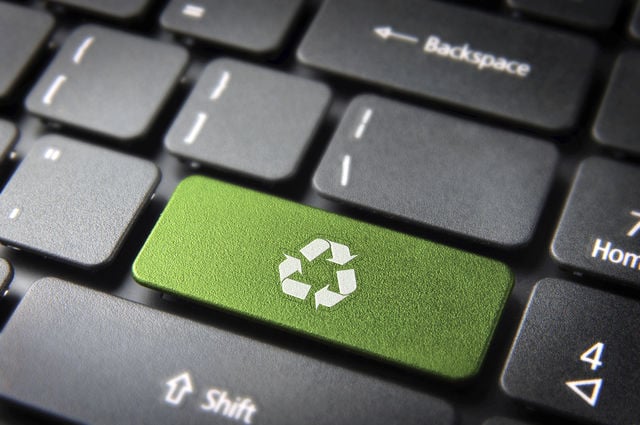Circularity: The sustainable hospitality frontier?
10 experts shared their view
In a finite world, striking a balance between the use of resources and ensuring that basic social standards are met is the crux of development. In business, the same applies: how do we navigate the murky waters of growth without depleting everything else? The global economy, with its fair share of challenges, is ripe for circularity but with little to show for to date as highlighted by the latest Circularity Gap Report [1]. Circularity offers many opportunities for businesses both in processes and development with a basic approach that includes: using less, using longer, using cleaner and using again. The final frontier of circular economy would be to design products which components can be reused indefinitely without loss of quality, or being disposed without any damage for the natural environment.
The Circular Economy is at the center of a growing debate and legislative initiatives both within Europe and globally. The European Commission adopted the Circular Economy Action Plan as a policy to accelerate Europe's transition towards a Circular Economy (in 2015 and renewed in 2020) [2, 3]. Initiatives under the Circular Economy Action Plan have repercussions on how businesses conduct and market their activities from using standard methods in quantifying claims about environmental footprint (making claims reliable) to tackling packaging waste.
Despite the increasing interest and attention given to circularity in political circles and certain industry sectors, the hospitality sector seems to be only partially involved with scattered initiatives. With this in mind, the following questions are to be considered:
- Is a circularity in hospitality a myth or reality? Why? What are the circularity gaps?
- If a 'reality', and on the base of your personal and professional experience, which are the best practices in implementing circularity in hospitality?
Bonus question:
- What are the costs and benefits associated to circularity?
References
[1] GGRi (2022). The Circularity Gap Report 2021. https://www.circularity-gap.world/2021
[2] European Commission (2022). Circular economy action plan. https://ec.europa.eu/environment/strategy/circular-economy-action-plan_en
[3] European Commission (2015). Closing the loop - an EU action plan for the circular economy. COM/2015/0614 final. CELEX:52 015DC0614" target="_blank">http://eur-lex.europa.eu/legal-content/EN/TXT/?uri=CELEX:52 015DC0614
Guest contributors: Lucia Tomassini & Elena Cavagnaro
Embedding circular economy principles into hospitality is not a myth, but a necessary ambition. It is crucial that the industry transitions away from a linear and extractive business model to a circular model with regenerative environmental impacts. Our Pathway to Net Positive Hospitality emphasises embedding principles of circular economy as a necessary end-goal if we are to secure a sustainable future for the industry.
However, nor is circularity in hospitality a substantive reality yet, either. Whilst some companies are leading the way in waste reduction efforts for specific items (such as single-use plastics, or food waste), circularity still needs to be truly embedded into hospitality's DNA. A key barrier to this is the fragmented nature of the industry, with varying ownership structures and numerous stakeholders and suppliers with differing interests. A lack of policy and financial incentives means circularity is also not a clear priority for many.
Embedding circularity cannot happen overnight. But regardless of their starting point, every hotel can and should start taking action. This requires collaboration at all levels; from engaging employees and guests within a hotel, to harnessing strengths and capabilities of different stakeholders, and working with suppliers to support action across the supply chain. This requires a shift from a competitive mindset to a pre-competitive one, basing decision-making on more than just the bottom-line, and recognising and harnessing the shared benefits of embracing circularity in the long run.
For those just getting started, a good place to begin is by understanding your impacts, and making sure there's a common understanding across the company. How much waste are you producing? In which areas? What items are most common? Invite colleagues from across different departments to review their impact. Once you know this, you can start setting objectives and working to phase out the most common and easily replaceable/avoidable items, before moving to address the trickier ones. Finally, you should extend this to your supply chain, to encourage the same process across your suppliers.
Increasing circularity in hospitality is certainly possible, however it may never be truly circular, even when all stakeholders involved are supportive of the idea. As an example, solar and other forms of renewable energy are excellent options for many accommodation providers because it allows them to tap into Earth's natural resources as a source of heat and electricity for their operations and the comfort of their guests. But even renewable energy resources have an impact on the environment. Of course, renewables can be manufactured with energy from other renewables and recycled at the end of their life, but there are always impacts and losses. With that said, we can make efforts to strive for a more circular hospitality industry. Fully and truly circular may not be possible, but this doesn't mean a sustainable hospitality industry isn't possible. Systems often have many different interdependent variables and complexities that keep them sustained, even when certain stressors are present.
Some of the biggest gaps beyond energy consumption and energy sources are the products used within a property. Materials to create products are extracted from all over the world, transported, processed, transported again, and finally manufactured into a product before being transported yet again to a hotel. This indicates that supply chains in the hospitality industry are far from circular and more linear in nature. There is research that suggests that the products used by an accommodations provider create a larger carbon footprint than all of the energy consumed by that same property, yet it's almost never accounted for. There must be better options made available to find and obtain products used by a hotel. This may simply mean more effort is required to find local, sustainably harvested and processed products or to provide more opportunities for such products to be created. Governments and businesses everywhere have made rules and guidelines that they must set aside a certain number of contracts or dollars to do business with businesses such as Minority Owned Business, Women-Owned Businesses, Disadvantaged Business Enterprises, Small and Local Businesses, and so on. Similar policies could be established to purchase from Locally Owned Businesses and those with proper sustainability standards.
With the changing mindset of consumers towards sustainability and wanting a more local experience when they travel, this is an opportunity for hotels to adapt their product offerings (especially in culinary) to deliver more authentic flavors by integrating local foods and spices purchased from local vendors.
A few months ago, we did published a magazine on Regeneration, including interviews from the World Economic Forum and people working on the ground, including a case study in Sri Lanka, which might be of interest for more insights on circularity. https://www.wei-think.com/_files/ugd/9993c1_3038a0580a8a4ae5b2eccbc9dda68cf2.pdf
The feedback was unanimous: from developed nations to countries in development, circularity in hospitality is far from being a reality and is facing multiple challenges at different levels of the industry, among them:
- Building circularity: how to create continuity through the lifecycle of a hospitality property, when developers, owners and operators can be different entities, with various timeframes and strategies that can be conflicting.
- FF&E circularity: hotels are refurbished every few years, what are we doing with the furniture, linen, plates, materials.
- Day-use circularity: what about waste from water, food, toiletries and so on.
Hotels are complex assets, combining under one roof the problematics faced by multiple industries. It could be interesting to look into all these industries and see how they approach circularity and get inspired to tackle every single aspect of circularity and what it means at each level within hospitality.
Circularity would be a solution addressing the “single use nature” in the hospitality industry that is essentially 'the killer' for all things sustainable. What we collectively need to seek are the options and innovations that allow us to re-use, re-package and re-purpose products. Secondly, we must ensure that they are coming from and returning to a supply chain within each ecosystem and community we have properties in. Projects that are centred around their community can address the issue of waste management locally in finding a shift towards more efficient waste practices, and reusable materials that are all sourced from the Neighbourhood. It all starts with sourcing local, supporting local and ensuring the supply chain is vetted to ensure smart waste management around our properties.
In order for the industry to fully embrace sustainability, or circularity, this mainstream time would take its toll as we will continue to over-indulge with unsustainable practices such as mass buffets, single use packaged items, unconscious shopping habits, which are all one-time use items being directly disposed of again. Single use packaging's though many are working to properly “recycle” millions ends up into different natural ecosystems every year and it has become the responsibility of businesses, and properties to lead and control this issue in finding alternatives that suit the locality.
Hospitality companies would ultimately need to show and prove in real life what they are doing to address such a deficiency. A minor step would be to get reusable items from locals – handmade products, if the hotel is done using the item for a specific purpose – maybe it can be donated back into the community and used for another purpose. We need circularity! We must learn to reuse. When talking about a circularity gap we speak of tangible things will have end life or have an expiry date… BUT the key focus remains to be about choosing materials with longer life cycles and becoming very creative and innovative in how we can re-use others. It is possible – but we are not there as a society, as industries – not even close. We have to ensure the all-round general understanding of the drastic effects of single use items.
A report on the circular economy and the reuse of products has found that extending the lifecycle of products through value-retention leads to a reduction of raw materials use by 90% decreasing the greenhouse gas emissions quite considerably - a net-zero solution with reusing of materials at the centre.
Circular economy is what we need to strive forward across the whole value chain – from design, supply, sourcing to re-purposing of materials that can last for generations – we all need to align on this if we want to become sustainable with the fitting bottom line for all stakeholders. Because a circular economy can support the local communities, battles the biggest issue of waste which results in damages to our ecosystems and biodiversity loss, it ensures a cleaner planet and saves money for value. True Sustainability.
What more would our industry seek to achieve for impact?
The failure of circularity so far has a lot to do with the perceived bennefits for companies, and the hospitality industry is no different.
The purpose of circularity is not clear for managers if it is not connected to key performance indicators at corporate level.
For example, suppose the bennefit of the effort of organizing waste to be suitable for the circular economy is generating benefits hard to link with the hotel strategy and performance metrics. In that case, it is most likely that the management will not prioritize it.
To be integrated into the core of the business, circularity needs to be embedded as part of the business model, influencing the design of processes, products, and services.
It should also be linked to innovation, making it part of the value proposition and an essential aspect of sustainability goals.
For example, one key aspect of a Climate Mitigation Action Plan is efficiency both upstream and downstream. In this sense integrating circular practices within the business should probably play a relevant role in carbon emissions reductions.
Linking circular economy practices with direct key performance indicators is fundamental to catch the interest and efforts needed for connecting a hotel with the key partners it will require to make it work.
What are the best practices to promote circularity in hotels? When I teach, I devote three class sessions and 46 textbook pages to this matter. Here, I will address this question briefly.
Hotels should assign a waste management champion who will guide the property's efforts, and a leader for each department that generates a significant amount of waste. The champion should generate periodic reports and share them with the leaders. The leaders should be accountable for establishing and achieving their departmental goals.
Hotels can maximize staff cooperation by creating excellent training programs; specifying desirable behaviors in employee job descriptions; evaluating staff on their performance; and providing incentives. Also, some hotels make reuse and recycling relevant by donating their used goods to the charities that employees favor; and taking staff on field trips to the recycling and composting plants that accept their properties' materials.
Hotels should perform comprehensive audits to better understand their waste management problems and opportunities. They should conduct periodic departmental audits, too. It's helpful to share the audit results with staff and ask them for advice about improving performance in their departments.
Coordination with haulers is essential, because haulers can provide advice about recycling markets, equipment, educational materials and other matters.
Recycling bins should be placed next to waste bins, and have signs that indicate where recyclable commodities and trash should be placed. Symbols and pictures should be used to communicate proper placement, too.
Here is a non-comprehensive list of significant waste management opportunities.
- Unnecessary food purchases can be reduced, unused food can be donated, and food waste can be composted. Such actions cut hotel procurement bills and hauling costs, and keep food out of landfills where it creates methane. Food waste task forces can be formed to guide these initiatives.
- Furniture can be refurbished or donated, rather than disposed. Mattresses should be donated or recycled.
- Single use plastics should be phased out. Some hotel chains are doing so.
- Amenity dispensers should replace the tiny amenity bottles in guest bathrooms.
- Some hotels achieve 80% reuse and recycling rates for construction and demolition materials by coordinating well with their builders, haulers and the organizations that accept their materials.
Good waste management programs enable hotels to reduce environmental harm, cut costs, assure regulatory compliance and satisfy guests and staff.
Circularity in hospitality is neither a myth or a reality. It would be a myth if we ignored all the efforts that fall short of 100% circularity or zero waste. Fortunately, we do see real efforts to deliver circular concepts in hotels and tourism. On the other hand, circularity would be a reality if it was integrated in everyday hospitality operations, which isn't the case—yet.
This week I attended a circularity conference hosted by Saxion University in the Netherlands, where researchers, entrepreneurs and students shared their best ideas on design, implementation and facilitation for a circular economy. Here we discussed some quite promising innovations, which are available for organizations looking to minimize their use of resources and energy. With regards to food, there are now examples of flagship circular restaurants developed by Dutch banks in Amsterdam, where circularity is the key asset: from furniture made of recycled KLM uniforms, to fermentation techniques to make the most of leftover food, to the use of refurbished kitchen equipment and conscious waste management, using a guide for waste hierarchy where each step represents a less desired process. These steps are (a) prevention, b) re-use, c) burn to generate energy, and d) dumping. (Lansink, 2015) Circular is all about recognizing and recapturing value of materials and using their constituent components as many times as possible.
Businesses that do the analysis and become conscious of their material use, need to change their business model and promote value retention with their key partners and suppliers: encouraging them to share responsibility for sustainable use, rather than selling resources for single use. Circular principles of prevent, reduce, re-use, or regenerate apply to any materials relevant for hospitality: whether it's building materials, delivery vans, furnishing, beds and mattresses, textiles, (often still useful as isolation material in a last downcycle), kitchen equipment, or guest facilities: any product can be more circular than before. Water and energy should also be regenerated across the property.
At the circularity conference, we saw how a Saxion interdisciplinary student team designed and built a circular tiny house for a holiday park. Its owner had simply offered the team 30,000 euros and a challenge to achieve maximum circularity. The team reached 80% circularity as they did their research and put to use their skills in finding second hand building material suppliers. They applied technical innovations such as modular and movable building parts, a re-usable sanitary cube, and the use of plaster made from wastewater silt.
These best practices where students, researchers and suppliers work together to achieve circularity show that businesses are in the process of revaluing their key resources, their CO2 footprint and life cycle. The ability to connect to emerging technologies and key partners will be critical in boosting this effort towards zero waste.
Sources:
- Jonker, J., Faber, N., Haaker, T. Quick Scan Circular Business Models. https://circulareconomy.europa.eu/platform/sites/default/files/quick-scan-circular-business-models_ebook.pdf
- Lansink, A. (2015) Waste hierarchy essential for circular economy. www.adlansink.nl
The idea of circularity was born in the context of production: designing goods so that materials could re-enter the technical cycle or be disposed off without damage for nature. That this idea is less applied in a service industry such as hospitality is more than understandable. Yet, circularity in hospitality is definitely not a myth.
In the Netherlands we have assisted to an increasing interest from the hospitality and tourism sector for circularity. It started with a project in Amsterdam involving major, high-end of the marked hotel chains; it continued with the institution of 'Circulair Friesland' (Friesland is one of the Northern provinces of The Netherlands) with a dedicated section for tourism; and continued with initiatives involving hospitality and tourism entrepreneurs in Friesland, Amsterdam, and Rotterdam.
Although these initiatives focus more on recycling or reducing the use of natural resources than the full application of circularity, they all see recycling and reducing as stepping stones toward circularity. More interesting is that they staid true to the people nature of hospitality by insisting that the surrounding community should be involved, too. Circularity in hospitality embraces both people and planet.
Circularity as a concept faces restraints in hospitality companies. One explanation could be that hospitality managers hardly ever control the entire product or resource cycle from cradle to grave/ cradle. That being said, efforts for 1) improved recycling, 2) waste reduction and 3) utilization of used and recycling materials and resources has become a reality in most companies. Building awareness for what circularity entails and consists of will be key for getting the most out of existing materials and resources and limiting the use of new ones.
Doughnut, circular and closing loops and the Sweet Spot
If we were to take a planetary selfie, what would we see? The Planetary Boundary framework brought forward by the Stockholm Resilience Centre more than a decade ago is a good way to interpret that selfie. Out of the nine boundaries, six are being transgressed, including most recently green water cycle [1].
If we were to take a humanity selfie, what would we see? Here the Doughnut Economics model [2] is a great tool to interpret our shortfalls and overshoots. Added to the nine planetary boundaries are twelve social dimensions from agreed minimum social standards from proper housing and nutrition to access to healthcare and education.
The sweet spot is thus to develop and cement strong social foundations within the planetary boundaries.
Easier said than done; nations are struggling to decouple development from resource use [3, 4]. Businesses are in the same boat. Although research demonstrates that a circular approach improves performance on the three pillars of sustainability [5, 6], implementation has been slow. This is due to numerous barriers that include but are not limited to lack of resources or technical skills all the way to absence of government support towards a circular economy transition [7].
How about the hospitality sector? Is circularity in hospitality a myth or reality? What are the circularity gaps?
Not a myth yet, not a reality for most.
And the following flows can be implemented as a strategy moving forward. Based on the work by Bocken et al. [2016], the 2021 Circularity Gap Report [9], proposes four strategies (pp.25-26) to achieve greater circularity and regeneration:
Narrow flows—Use less: This is already achieved in hospitality design when low embodied carbon material is used, when upcycling is implemented and natural light is maximized in hotel properties.
Slow flows—Use longer: The hotel sector is hungry in resources throughout the lifecycle of a building, particular in the regular FF&E upgrades, refurbishment and renovation cycles. The use of durable, long lasting material coupled with a plan for reuse, repair and return (see 'Use again' here below) should be the name of the game here.
Regenerate flows—Make clean: The hospitality sector has so many opportunities to implement renewable energy production on- or off-site while actively participating in a community-supportive and regenerative agriculture via its food supply tapping into the 'Make clean' strategy.
Cycle flows—Use again: Picking from 'Use longer' strategy, recycling, reusing, repairing, composting are already well-established at many properties. Here creativity goes a long way to achieve outstanding results.
Implementing a circularity strategy helps tackles SDG12 on Responsible Consumption and Production (in particular Target 12.2, 12.3, 12.4 and 12.5).
Bonus question:
- What are the costs and benefits associated to circularity?
Some good research has been published on the topic already (reach out!).
[1] Wang-Erlandsson, L., Tobian, A., van der Ent, R. J., Fetzer, I., te Wierik, S., Porkka, M., Staal, A., Jaramillo, F., Dahlmann, H., Singh, C., Greve, P., Gerten, D., Keys, P.W., Gleeson, T, Cornell, S. E., Steffen, W., Bai, X., Rockström, J., (2022). A planetary boundary for green water. Nature Reviews Earth & Environment. https://doi.org/10.1038/s43017-022-00287-8
[2] Raworth, K. (2017). Doughnut Economics: Seven Ways to Think Like a 21st-Century Economist. Random House.
[3] Wackernagel, M, Hanscom, L, & Lin, D. (2017). Making the Sustainable Development Goals consistent with Sustainability. Frontiers in Energy Research, 5 (18). doi: 10.3389/fenrg.2017.00018
[4] GGRi (2022). The Circularity Gap Reporting Initiative: a global score for circularity. https://www.circularity-gap.world/
[5] Fonseca, L.M., Domingues, J.P., Pereira, M.T., Martins, F.F. and Zimon, D. (2018). Assessment of circular economy within Portuguese organizations. Sustainability, 10(7), 2521. https://doi.org/10.3390/su10072521
[6] Guldmann, E., & Huulgaard, R.D. (2020). Barriers to circular business model innovation: A multiple-case study. Journal of Cleaner Production, 243, 118160. https://doi.org/10.1016/j.jclepro.2019.118160
[7] Vermunt, D.A., Negro, S.O., Verweij, P.A., Kuppens, D.V., & Hekkert, M.P. (2019). Exploring barriers to implementing different circular business models. Journal of Cleaner Production, 222, 891–902. https://doi.org/10.1016/j.jclepro.2019.03.052
[8] Bocken, N., de Pauw, I., Bakker, C. & van der Grinten, B. (2016). Product design and business model strategies for a circular economy. Journal of Industrial and Production Engineering, 33(5), 308-320. doi:10.1080/21681015.2016. 1172124
[9] GGRi (2022). The Circularity Gap Report 2021. https://www.circularity-gap.world/2021










